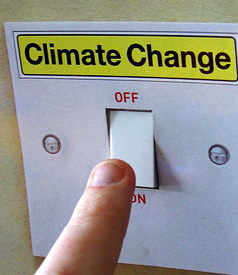In 1938, it was possible to consider Mr. Hitler a respectable man. In 1960, it was possible to believe that the Soviet Union would win the cold war. In 2010, it is possible to parse climate change as an invention of dishonest scientists.
History is made by choices. How to organize one’s action as a function of imperfect information? Generations have split; men have been fooled; others made the correct choice. Those who make the good bets design the future.
One had to choose: Munich or London; the USSR or the free world.
We must choose: climate change skeptics or the community of climatologists.
Is the comparison excessive? No. The environmental crisis – one for which climate change is one aspect only – poses a challenge of historic magnitude for this generation. Acknowledging the magnitude allows us to imagine how to abate the challenge. The balance of this century’s human societies depends upon the choice we will make. Either we consider climate change a major challenge that calls for a profound change in our societies, or we deny its reality and attempt to preserve the established order.
Is the knowledge of how the terrestrial climate operates perfect? No. Is the information available adequate to decide? Yes. All questions are not resolved; all debates are not closed; all research has not been concluded. But the overall scenario predicting change is well founded and solidly constructed. Among climate change skeptics (in France, Mssrs. Allègre, Courtillot, Galam, Gerondeau, Rittaud etc.), none has produced a sufficiently strong argument to successfully pass the test of scientific validation procedures. On the other hand, not a single legitimate question has been put aside by climatologists. And for those that remain unanswered, the investigation continues. What the science explains to us is not a dogma. But given the importance of what’s at stake, citizens have adequate knowledge in hand to determine who better describes the state of the biosphere.
Why does climate change skepticism, in spite of the weakness of its arguments, find such favorable ground for proliferation? Among many explanations, one seems decisive. As soon as a person is aware of the seriousness of the environmental problem, one conclusion becomes inescapable: to prevent the disaster, we must drastically transform a system based on continuous growth of material production. Change our habits. Upset, also, many established conditions.
Refusing to concede what the climatologists portend allows a person to believe that nothing will change, that nothing will be upset. That’s why the most flatly reactionary of ideologies may be clearly decoded behind climate change skepticism.
Translation: Truthout French Language Editor Leslie Thatcher
Reporterre.net is the site of Hervé Kempf, author of “How the Rich Are Destroying the Planet,” “Pour Sauver La Planète, Sortez du Capitalisme” [not yet available in English], and journalist at Le Monde where this article originally appeared.
Join us in defending the truth before it’s too late
The future of independent journalism is uncertain, and the consequences of losing it are too grave to ignore. To ensure Truthout remains safe, strong, and free, we need to raise $46,000 in the next 7 days. Every dollar raised goes directly toward the costs of producing news you can trust.
Please give what you can — because by supporting us with a tax-deductible donation, you’re not just preserving a source of news, you’re helping to safeguard what’s left of our democracy.
